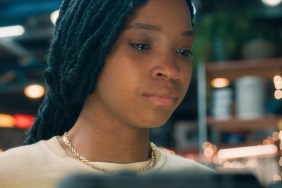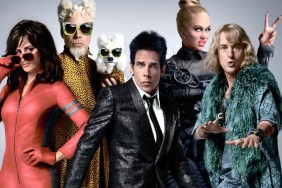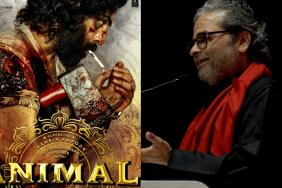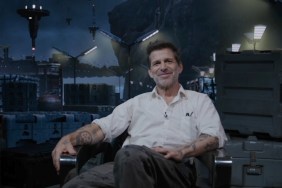Channeling the spirit of Waters, Castle and Lewis

It’s all about the blood. All about the lurid. All about the old school. All about the reverence for the macabre. And, All About Evil in San Francisco filmmaker Joshua Grannell’s feature debut.
For years, Grannell has doubled as the sensational Peaches Christ, the San Fran personality at the center of Midnight Mass, a regular event that celebrates sordid cinema. It’s at a Mass event in Los Angeles – where Christ hosted a rare screening of Elvira, Mistress of the Dark (with Elvira in person) – where I had first met Grannell. At the time, this true horror fan at heart was getting his crew together for Evil, a pitch black tale about a woman who operates a revival movie theater. She begins to dabble in the creation of horror films herself, except what her enthused audience doesn’t know is that she’s killing people on film for real.
Over a year later, Grannell has his film in the can – with stars Natasha Lyonne, Thomas Dekker (Terminator: The Sarah Connor Chronicles), Noah Segan (Deadgirl), Anthony Fitzgerald (Laid to Rest), Mink Stole and Cassandra Peterson. After a San Francisco premiere, he’s taking Evil on the road for an independently-financed limited theatrical run. After playing to Provincetown International Film Festival audiences this Friday, the director is heading back to the West Coast for Evil‘s Los Angeles Film Festival on Thursday, June 24.
Shock spoke with Grannell shortly before his flight to Massachusetts.
ShockTillYouDrop.com: Where did you fascination with horror come from?
Josh Grannell: Well, I was definitely one of those kids who growing up in the suburbs of Annapolis, Maryland. I was raised on HBO and VHS, like the local ma and pop video stores. And I was just drawn to movies at a really young age. I think they fed my own creativity and also my own boredom. I loved them all. I watched “Movie Macabreâ on TV growing up. So I think a lot of my love for B movies and monster movies and drive-in fare was being fed to me via Elvira. Then, I would watch the Steven Spielberg-type stuff on HBO. I loved Poltergeist. I was really, really fascinated by Poltergeist as a kid. Even things like The Exorcist and lots of the classics. I remember when the movies came in those clam shell boxes. I just kind of devoured all that stuff. Even today, I have a terrible memory, but I’ll be watching something on TV or on DVD and it’s like, “Oh yeah, I’ve seen this before,” because I watched so much of it that I think it was warped into my brain like a sponge.
Shock: Well, when you’re young, there’s this taboo nature to horror. You know you shouldn’t be watching it, but the packaging is so alluringâ¦
Grannell: Exactly. Some of that, for me, it was like a KISS album cover where the art is always more interesting. The package is more exciting than the actual thing itself. I would buy KISS albums and just stare at their makeup and what they looked like, but I never really cared about playing the record that much.

I had already been doing the character of Peaches for years. I always wanted to be a filmmaker and the performing stuff was kind of a hobby. I did improv theater in high school, but I went to film school in college and I really moved to San Francisco partially because I was fascinated by the underground film scene here that I learned about in college. I obsessed with the idea of San Francisco. All About Evil was really the manifestation of a short film I made after making a bunch of Peaches horror parodies. Cheap, low budget, really, really silly little movies. I made one called Grindhouse that did not have Peaches in it just to see, “Could I make something that people like that wasn’t drag centered and that wasn’t totally focused on this popular character that I was performing as?” That was in 2003 I made that short. Then I probably took some time off from there and did some other things and started thinking about, “You know, I really should write a feature. If I’m going to really pursue a career as a filmmaker and not just as a performer and a film programmer, then I need to put my money where my mouth is and actually write a feature.” I set out to write the feature version of that movie about five years ago.
Shock: Taking on the Peaches persona, thereâs a bit of showmanship in you. It didn’t surprise me to read you were a fan of William Castle.
Grannell: Yeah, it’s funny because John Waters just released a book called “Role Models” and I’ve been reading the book. Honestly, I think growing up as a kid in Maryland obsessed with horror and the transgressive and avant garde, I was really, really drawn to John Waters. Pink Flamingos, when I saw it, I could not get over it. I mean, it was the most repulsive, upsetting things I’d ever seen and I absolutely loved it and it changed my life. I mean, I saw this before I saw Rocky Horror. Reading John’s book “Shock Value,” I was introduced to William Castle, Herschell Gordon Lewis, Russ Meyer and Ted Michaels. I honestly think that John’s ability to share his role models with other filmmakers is brilliant because it led me to rent all these great old William Castle movies. Again, being a child who loves Elvira, it fit right in. Also, being a big drama queen and loving the spirit of showmanship, it kind of goes back to what we were talking about with the KISS album cover. I was almost as fascinated with the way that he marketed his films or presented them as much as the films themselves. But, I love his movies. I mean, I actually think the movies are sort of underrated. People focus so much on the fact that he shocked audiences with electric buzzers. They sometimes forget like, Straitjacket is maybe one of the best movies ever made, it’s just incredible.
Shock: In agreement with you there. I loved his balance between serious thrillers and funhouse films like Thirteen Ghosts.
Grannell: Oh, totally. The Tailor is a great movie. I loved Homicidal. I know it’s not very PC of me to say, but I would love to do a whole film festival with films like The Tranny Killers, Silence of the Lambs, Psycho. But, Homicidal to me is so, [laughs] oh my god, it’s just so bizarre. I love it. I mean, it’s obviously a Psycho rip-off.

I would say it’s somewhere between like a cameo and a co-starring role. It’s not very big. It was definitely the thing I struggled with the most. At first, she just had a cameo and when I was writing the movie, a lot of the screenwriting groups that I work with â I co-founded a screenwriting group to actually help develop this whole project with a bunch of other writers in San Francisco. They kept saying, “Oh, we want more Peaches,” because of course she has one of the funniest lines. I’d write a little bit more and then she found her way into the finale and I have to say, it was probably one of the things I think that was the biggest challenge for me making this movie was dealing with Peaches. I feel like there’s a split personality, a lot of weird psychology. And doing the movie, I was really terrified of it being obnoxious or unnecessary, or just totally self indulgent. I have to say, of all the performances in the movie, the one that had the biggest pile of cutting room floor footage, it was Peaches. I still kind of cringe a little bit. But, I also felt like I built a whole career. Peaches is the gift that keeps on giving. I wouldn’t have gotten financing to make this feature if it weren’t for Peaches. So, it’s sort of this weird, [laughs] this double-edged sword. On the one hand, I go through periods of not wanting to deal with Peaches, and on the other hand I have to be very grateful for all the gifts that Peaches has brought me.
Shock: How did she secure financing for this film? Did you find San Francisco to be film production friendly?
Grannell: It has a bad reputation in the industry for being really expensive and not being friendly. Just the physical layout of the city is a big challenge because of the hills and the streets and dealing with trucks, and parking. Look, it’s tight quarters, not sprawling by any means. It’s really expensive. For us however, because Peaches Christ is popular in San Francisco and because my midnight movie show was so well known, and the city has kind of grown to embrace Peaches as part of the city, that actually worked to our advantage a great deal as far as securing locations and getting waivers. We’ve got hundreds of extras in this movie. We never had a budget to pay extras. We were able to call in a lot of favors because of Peaches’ fans, or love or support for our midnight movie scene which really truly is a cult. It just happens to be a big cult here in San Francisco. A lot of people have enjoyed what we do here.
Shock: Talk about the cast you’ve got. You brought in pal Cassandra Peterson, who’s actually not doing her Elvira thing. Also Natasha Lyonne in your lead role – was she someone you always had in mind?
Grannell: I didn’t write any of the roles at all with any one actor or actress in mind. It wasn’t until I finished the screenplay that I was actually able to look around and go, “Oh my god, Cassandra could really play this part.” But, I didn’t write it for Cassandra and I didn’t write the part for me. I think a lot of people think that I did because there were certain things that were tweaked once they were cast to really suit their performances. But, with Natasha, I’ve always been a fan, and I did always write the part for what I would call an outsider type of actress. I grew up worshiping performances by incredibly talented women, actresses who don’t exist anymore. I don’t see them around. So, Sissy Spacek or Jamie Lee Curtis or Shelly Duvall, where they’re strange women with this incredible talent. Natasha Lyonne has always been that for me, one of those actresses I was just naturally drawn to and has always been on my radar. Honestly, I didn’t know how to get in touch with her. When I was meeting with cinematographers, I was introduced to Tom Richmond who ended up shooting the movie. He had just come off doing Nick and Norah’s Infinite Playlist. I didn’t think Tom would necessarily do my little low budget black comedy movie, and Tom did. One of the movies that he shot was The Slums of Beverly Hills. When I made that connection, I asked him if he was still friends with Natasha and if he could get the ball rolling. My screenplay was not the kind of screenplay you wanted to pass on to an agent or a manager because it can’t work â it never really ever reached the hands of the talent. But, it was a screenplay that when people like Tom or Natasha read it and they got it, when they connected with my sense of humor or what I was trying to do, the screenplay kind of sold them on the movie. The fact that Tom was attached to All About Evil had a lot to do, I’m sure, with why Natasha felt comfortable getting on board.

Shock: It sounds like you surrounded yourself with a good family which must have taken off the edge of sitting in the director’s chair for the first time.
Grannell: It was awesome because I really felt like there was this sort of marriage of a Hollywood group of folks, people who have been on TV shows, have worked on lots of movies. Tom Richmond has shot a ton of movies. Darren Stein, who was one of the producers, was really helping put that together and pull those elements together with my world up in San Francisco which was more of a bohemian, underground, indie, underground film world and drag counterculture. And I have to say, I think the marriage of all those things, there wasn’t ego around it. I think everyone inspired each other and it just came together really well. Certain people like Thomas Dekker, for example, just fit in. He was such a pro and he was so talented and so good at what he does that you forgot where everyone came from and what they’d done before. It was like everyone on the set was neutralized and we were all sort of there creating together.
Shock: Tonally, what areas does the film explore? Does it push buttons? Would you call it a horror film?
Grannell: Well, I guess I think it does. I hesitate to call it a horror film first. I would describe it as a black comedy set in the world of an old horror movie because horror right now, it’s just this really interesting time. The stuff that seemed to be really popular is really, really extremely violent and really dark. I love all different kinds of movies, but the movies that I’m sort of celebrating in All About Evil tend to be more like those films that I was introduced to at a young age like the William Castle movies, Herschell Gordon Lewis was a big one. There’s a real spirit of fun to all this stuff that we’re doing. It’s almost like the movie had to have a sense of humor for it to come together. The tone is strange. I didn’t want it to be the thing that you expect from a drag queen director where everything was silly, and retarded and over the top and chaos. I didn’t want the actors winking at the camera through the whole movie. I wanted to tell a story and use all different kinds of cinema tropes that I love. I was kind of walking a line where it’s funny, it’s dark comedy, it’s a little film noir, there’s mystery in it. It’s certainly got the gore shots, but it’s funny. I hesitate to call it a horror film right now because it’s a horror film that’s definitely not a contemporary horror film. It’s more a movie you might kind of call a horror movie in the â60s, or â70s, or even the â80s.
Shock: As a first-timer, what were your thoughts on the shooting process?
Grannell: We shot for 35 days and it did not go smoothly. [laughs] It was more of a budget than I’d ever dreamed of working with when making our silly little short. When you blow it up and you have SAG actors and more, it’s amazing to me how quickly there’s no money, no money at all. One experience that was a real eye opener for me was because we werenât doing the low budget indie movie where it’s characters in a room with some psychological horror. I wanted ’80s gags with ’60s Herschell Gordon Lewis gore effects and hundreds of extras and 25 speaking parts with multiple locations. Everyone’s kind of looking at me like, “Are you crazy?” And the director’s in drag for eight of those days! A “challenge” is kind of putting it mildly because there were things that would come up where we’d be shooting two all-nighters in a library for a number of scenes that really demanded four nights in that library. I’d be rewriting the screenplay on the set of the movie. What was really complicated was the fact that it’s a movie about a woman making movies. So, we’d have to shoot her movies and edit them so that we’d have them to project during the shoot. We literally were making little movies while we were making the big movie and that became very complicated.

Shock: You’re still on an endurance run with the promotion of the film now and the posters and the web awarenessâ¦
Grannell: What’s ironic about it is, that’s the stuff I did as a filmmaker before making the movie because I had a whole career celebrating other people’s movies, and creating shows and gimmicks of Peaches Christ. And my Midnight Mass movie series, where I’ve been doing these kinds of events and shows publicly, marketing them for so long, and really celebrating and embracing the spirit of things like William Castle that now that we actually have our own movie, I find it to be one of the most satisfying challenges of coming up with these sorts of ideas. We don’t have a studio behind us. We do have our own production company which the investors of All About Evil have invested in. So, I do actually now have a production company in San Francisco with employees. We are self-distributing for theatrical and we’ll probably, we’re talking with studios about the VOD and the DVD and television and foreign sales and all of that, so everyone hopefully who wants to see the movie will get to see the movie. Part of the fun is creating this old fashioned road show and doing it our way. I love it. I mean, it’s totally probably for me, the most fun part of making a movie has actually been sharing it with everyone and kind of presenting it the way you want to present it.
Keep tabs on all things Peaches Christ at her Facebook page. And watch a teaser trailer for All About Evil at this spot.





Source: Ryan Turek, Managing Editor









